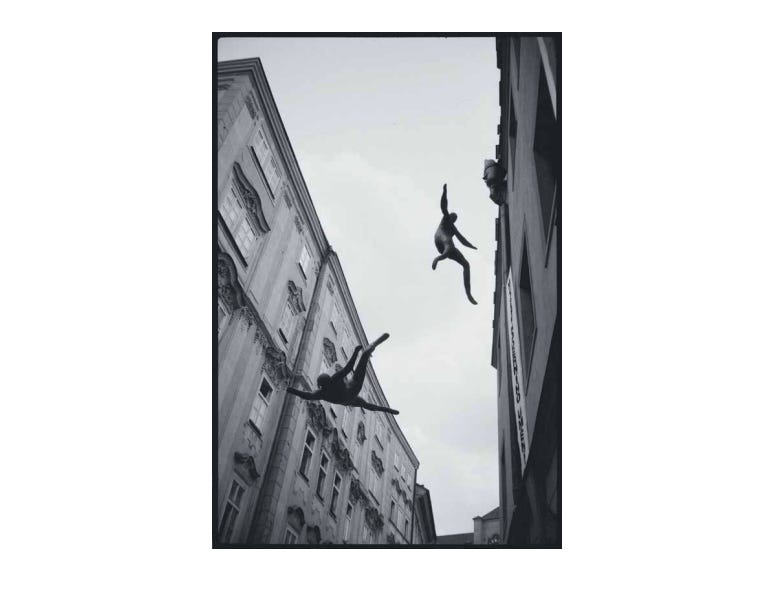The street's wet you can tell by the sound of the cars
That makes the record suddenly way darker

Today’s Hell World is for paying subscribers only but here’s an excerpt. If you’d like to read the rest please subscribe and go here.
“I only found out when the book came out that people didn’t know it was a photograph,” J.J. Gonson told me. We were talking about the cover photo she shot for Elliot Smith’s self-titled second solo album. A 25th anniversary edition of the beloved record along with all manner of other extras including a coffee table book of photographs she took of Smith was just released by Kill Rock Stars.
“Apparently all along people thought it was some kind of collage. I’ve had all these comments like ‘Oh my god, I never knew. What the hell is going on here?’ If people thought it was a piece of art, then they thought it was a piece of art about people jumping off a building. That changes my entire concept of how people perceived the record. They thought he put a picture on the record of people committing suicide. That makes the record suddenly way darker.”
Making a record with songs like “Needle in the Hay” on it seem any darker than it already is would certainly be hard to do. Instead the art installation outside of a museum in Prague she shot in the early nineties while backpacking around Europe felt playful she said. More like people floating to the ground than plummeting.
That’s something people who knew him often say about Smith himself too. For all his much touted suffering and darkness there was a lighter funnier side that most of us rarely got to see.
Alongside the photos the book is filled with remembrances from his friends and colleagues.
“The thing that stood out when you hung out with Elliott was his sense of humor,” Slim Moon the founder of Kill Rock Stars writes. “A spontaneous humor made possible by physical worldliness, fathomless insight, fearless honesty, and flagrant humility. Can any song in the world contain more of those qualities than ‘The White Lady Loves You More’?”
“From that first night [he saw him play] on, I always suspected that the most obvious interpretation of his words was just a dodge; an easy outer layer of the onion. There are actually a trillion interpretations intentionally built into the imagery and the irony and the internal contradictions. You know he had integrity, and the song had a ‘true meaning’ to him alone, and you believe in that meaning, but you also know he completely also meant all the other meanings too. ‘The White Lady Loves You More’ means exactly what you think it does, and also it does not mean that at all — it means something truer and deeper and a lot more funny.”
I’ve written in here before a lot about my love of Elliott Smith like the first time I saw him play in Providence in the late 90s and learned that openly crying like a baby at a show is something that could happen to a person or the time I bumped into him at the bar at the Troubadour in Los Angeles and completely bummed him out as this jocky guy wearing a yellow winter hat in the heat trying to talk to him about how much he meant to me (lol). Lately I’ve been listening to playlists of songs he covered and songs he simply liked to listen to like a real normal guy.
Gonson, a native of Cambridge, MA, who I know from the local music scene and her role as the proprietor of Once, a music venue in Somerville that is like all of the others everywhere currently struggling to stay afloat during the pandemic has a lot more stories of her own. She moved to Portland in 1990 where she would befriend Smith and go on to shoot iconic photos of him, Nirvana, Black Flag, Jane’s Addiction and many others. We spoke about the photos she took of Smith and how the club she runs has been affected by the pandemic.
Once is also holding “virtual venue” performances during the shutdown if you’d like to check them out here.
Obviously the music is great, but I don’t really “revere” too many musicians in too precious a way, even the ones I love. For some reason Elliott means a lot to me in a way that feels different. Why do you think people still care so much?
He was just unusually brilliant and he had the ability to put feelings into words. And in addition to that he had this voice. He would sing very quietly, and mic himself singing very close to the mic, so you really felt like he was talking into your ear. He was practically whispering sometimes, and there’s no way you could hear that unless you were very close to someone, so it has that feeling like it’s very personal, and you have to listen very carefully. And then there’s this guitar playing thing. I can’t think of many people who could do what he did playing rhythm and lead at the same time. I don’t know, I watched it a lot and it was quite something. He could write, sing, and play. There was so much intelligence all over the place.
Read the rest here and find more of her work here.




